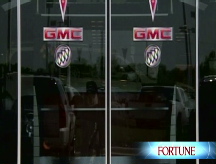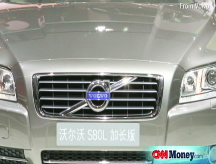Senate edges closer to auto bailout deal
Democrats appear ready to compromise with leading Republican critic of bailout, but fate of bill to provide $14 billion in loans to GM and Chrysler still in doubt.
NEW YORK (CNNMoney.com) -- The Senate moved closer Thursday night to voting on an amended proposal to bail out the U.S. auto industry with $14 billion in loans, after Democratic Majority Leader Harry Reid praised a compromise proposed by a Republican critic of the industry.
After hours of negotiations with Sen. Bob Corker, R-Tenn., top Democrats, and auto industry and union officials, Reid, D-Nev., said a vote on the bailout proposal could come Thursday night or in the early hours of Friday morning.
"I am hopeful we can finish this matter tonight," Reid said. "I don't know what the odds are that the Republican caucus will accept the work done by Sen. Corker. But we should know soon."
Corker's proposal would give the Big Three the $14 billion loan, but with strict restructuring conditions. It would force the companies to reduce their debt and would slash wages and benefits for auto workers. But by giving the automakers the cash they need to continue operations, his proposal went against the position of many Republican senators that the automakers' best course was to file for bankruptcy.
That provision is a tough pill to swallow for the auto union and Democrats. But because of the urgent desire to help Detroit, and realization that a collapse of one or more of the Big Three would be devastating to workers, Democrats are negotiating with Corker on the compromise.
Reid said an amended bill would likely pass the Senate, even if the compromise is not what Democrats would prefer to pass.
"We're ready to go," Reid said. "I think with rare exceptions the Democrats understand this is the Christmas season, that there's a lot of hardship out there. People are losing their jobs, losing their homes, losing their cars and losing their patience. If we're not able to work something out, 2.5 million people are going to be directly impacted."
Democrats don't know if they have the 60 votes they'll need to pass the measure.
Reid warned earlier in the day that if a vote fails, he will pull the bill from consideration, which could doom one of more major automakers to bankruptcy and possible closure.
"We have danced this tune long enough," he said on the Senate floor.
The legislation, which passed the House with support of the Bush administration and most Democrats, is designed to hold off a bankruptcy at General Motors (GM, Fortune 500) and Chrysler LLC at least through March.
It provides less than half the $34 billion in federal loans requested by automakers last week. Still, it may be enough to stave off the immediate threat of bankruptcy.
GM has said it needs $4 billion by the end of the month to continue operations, and believes it'll need an additional $6 billion in the first three months of 2009. Chrysler has said it needs $4 billion by the end of the first quarter.
Ford Motor (F, Fortune 500), which has more cash on hand than its U.S. rivals, is not expected to tap into this bailout in the coming months.
While the House measure passed with the support of 91% of Democrats, only 17% of Republicans voted for it. About half of the House Republicans who voted "yes" are from Michigan and other states in the Midwest that are home to auto plants.
But the Senate has far fewer Republicans from those states, and those who have voiced support suggested the bailout lacks the necessary votes.
"I don't think the votes are there on our side of the aisle," said Sen. George Voinovich, R-Ohio, on Wednesday.
Senate Minority Leader Mitch McConnell, R-Ky, said he opposes the bill.
"We reviewed it closely to see if it meets the criteria that I've laid out repeatedly for taxpayer protections and an effective strategy for securing the long-term viability of these companies. In the end, I concluded that it does not," McConnell said in a floor speech.
President Bush and others in the administration reached out to Republican senators on Thursday to argue "why this legislation is the most effective and appropriate approach to help the auto companies become viable for the long term," said White House Press Secretary Dana Perino.
Perino said the economy's "weakened state" made the bailout necessary. "Adding another possible loss of 1 million jobs is just something our economy cannot sustain at the moment," she said.
Republicans are in a 50-49 minority in the Senate, but Senate rules allow them to block or even kill the legislation unless Democrats can muster 60 votes to force a vote. Even with the support from the White House, Republicans vowed to do what was necessary to kill or make major changes in the House legislation.
Several Republicans argued on the floor of the Senate Thursday that a bankruptcy is still the auto industry's best option for shedding costs, debts and contracts it can no longer afford.
Earlier Thursday, Corker proposed three legislative changes he said would allow the automakers to make the changes they need to be competitive once again, short of actually filing for bankruptcy.
Corker suggested his changes would be enough to win the support needed from Republicans to pass the bill.
First, he proposed that GM and Chrysler must reduce their debt by two-thirds by March 15, or file for bankruptcy. He said that would give the automakers the leverage they need to renegotiate their debt with lenders and bondholders.
Second, he said the United Auto Workers union would have to accept significant equity in the companies to help offset future retiree health care payments, instead of cash or other assets the companies were to contribute to union-controlled trust funds that will pay those claims in the future.
Finally, he said the union would have to accept pay cuts for GM and Chrysler workers to levels paid at the U.S. plants of overseas automakers.
Corker, who has a GM plant in his state, said he discussed this last point with UAW President Ron Gettelfinger Thursday morning and that Gettelfinger "actually is talking to his leaders about this." Corker said he had also spoken to GM President Fritz Henderson and that Henderson "agrees that this will work."
"It does the things we need to do to make sure the bond holders and the UAW themselves do the things they need to do to make the company whole," Corker said about his proposals. "Let's leave here having done something that actually causes these companies to be healthy, vibrant, able to go into the future in a strong way for the first time in thirty years."
Corker's proposal may not attract enough Republican support, however. McConnell said he is in favor of a tougher alternative to restructuring the automakers.
An industry source said there was a lot of talk going on behind the scenes Thursday trying to find a compromise that would meet industry needs while satisfying Republican calls for stricter oversight.
But House Democratic leadership may balk at agreeing to any substantial changes to the bill. House Speaker Nancy Pelosi, D-Calif., vowed Thursday that she would not call House members back into session to consider changes in the bill. Passage of the same language by both houses is necessary before legislation can be sent to the President to be signed.
The stopgap measure that passed the House is designed to let the new Congress and incoming administration of President-elect Barack Obama craft a longer-term solution for the Big Three.
It is also designed to give the companies time to negotiate with creditors and the UAW on additional concessions needed to stem their ongoing losses.
But the bill also sets strict oversight of the companies.
There would be limits on executive pay, prohibitions for so-called golden parachutes and requirements that the automakers get rid of their corporate aircraft and not pay dividends while loans are outstanding.
The bill also provides for a presidential appointee, popularly referred to as a "car czar," to oversee the company's efforts to restructure their operations. If the car czar determines that the companies have not made progress on cutting costs, the loans would be recalled within 30 days.
In addition, the government would receive warrants - the right to buy a stake in the companies at a certain price - equal to 20% of the loan's value.
But Corker criticized the idea of a car czar.
"It's like a three-hump camel. I mean you couldn't make it almost more ineffective and more complicated," he said in floor debate. "It seems like with everything we do around here, we try to find a person who can save us if you will from the crisis that is happening."
CNN's Dana Bash, Ted Barrett and Virginia Nicolaidis contributed to this report. ![]()



